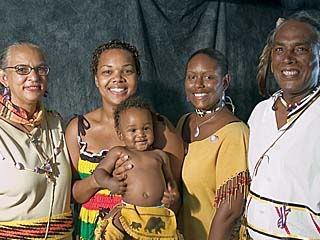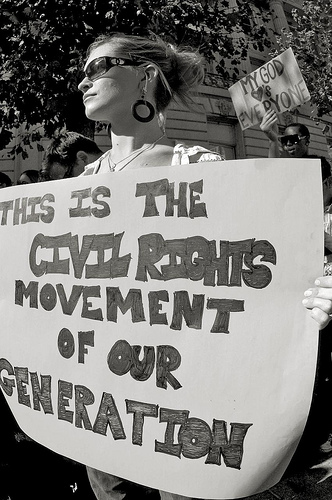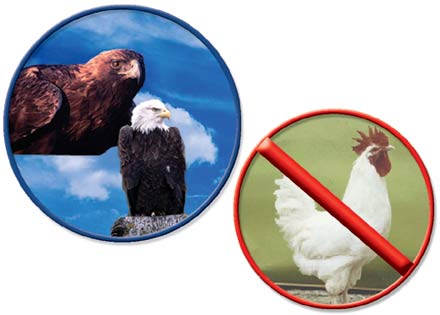happy inauguration day
An inauguration day message for those of who aren't political, but are activists of a different breed.
Aight. I’m just gonna speak on this once, then I’m done. This message is for my godchildren, praying folk, spiritual warriors, lightworkers, wakan women, men of magic and mastery, meditators and chanters, and for all those that have ears to hear. All of this railing and gnashing of teeth and swearing at TV screens and hyperbolic commenting on every move or action this new leader makes is not the move. More than ever, your purposeful energy and focus is needed, and frittering it away on ‘being in your feelings’ is effectively weakening our cause. Case in point: I work with a lovely woman, a godly woman who mentioned to me on our way to lunch today that she was doing the ‘Daniel fast’ with her church. I asked her about it and what it entailed and then went on my way. Moments later, we were both in the breakroom. Me eating my lunch and deep into my Facebook feed, purposely ignoring the goings-on in the room. She – along with at least a dozen others – staring at the inauguration on the TV screen with a long face and emitting a caustic comment to almost every line of the new leader’s inauguration speech. When I finished my lunch, I quipped to the others as I walked out, “What y’all watchin’?” before laughing and sashaying off to my next meeting (Yes. I said, sashay, dammit.).
Later, still intrigued by the ‘Daniel fast’ my co-worker mentioned, I googled it to learn more about it. The fast is based on the biblical passage from Daniel 1:12 which talks about eating veggies for 10 days. But looking back to the beginning of the chapter and taking the verse in full context, the larger story is about 4 Hebrew youth (Daniel being one of them) who were true to their faith and considered some of the ‘cream of the crop’ in their community. A new leader had recently taken control of their lands and had specifically picked these 4 to come ‘be on his team’ so to speak, which included learning his language and eating his food. Danny-boy was like, ‘Cool, I get it. New leaders come and go. It’s the Old Testament. Sh*t is mad unstable. But this whole eating the food thing? Nah. Not gonna work for me and my homeys. We are officially anti- that.’
The king’s caretaker was nervous. ‘If y’all just eat veggies, you’re gonna be thinner and ashier than everybody else on the team for sure, and that’s gonna get all of us in trouble. No way, Daniel-san. Not on my watch.”
To which Danny replied, “Just give us 10 days.”
After the 10 days were over, Danny and his 3 kinfolk were fatter and prettier than everybody else in the place, so they were left to their own devices from then on. Over time, they came to be known as the wisest men in the land and even became known for having ‘extraordinary’ powers.
Now, all mystical / spiritual texts can be taken either literally or as encoded message. What I took from that text was not a command to eat veggies for 10 days, rather it was a command to not swallow the BS if you want to stay true to your own values and grow in personal power.
Don’t consume the filth, the vitriol, the bad behavior. Refuse it. Ignore it. Fast from it. If you do not, your mind and energy will be scattered with every new occurrence, and you already know there will be plenty of occurrences. Furthermore, don’t be dismayed when some of your assumed kinfolk start supping at the king’s table. Instead, bring all of your energy back into yourself. Redouble your efforts on your work, your craft, your service. Dance your dances and sing your songs with all the windows open and the lights on. Never let them see you looking thin and gaunt, or sad or frustrated or unhappy or bitter. Support and speak life into others who are working on causes that are aligned with yours, and watch us all grow fatter and stronger.
We all have our chosen work. I am not a political person, but I appreciate and support and answer the calls of those who I trust that are activists in that arena. Those of us who focus our efforts on areas that transcend politics have a responsibility to work just as hard as our cohorts. We fail them and ourselves if we focus on the distractions and neglect our own goals and missions.
So, for all of us who are officially ‘anti-that’, today was your inauguration. What promises will you keep, what accomplishments will you count over the next 4 years?
inappropriate dinner conversation: the curious case of the Cherokee Freedmen
The year is 1983. 6 men arrive at a voting precinct in Oklahoma. The men are of varying ages and statures, but there is at least one trait that they all share. They are all black. As they approach the door of the precinct, their leader, a Reverend called Nero, issues a quick word of encouragement to his band of braves. The men steady their nerves and their resolves. Not one of them is sure what may happen next.
It only takes a few moments for it to all be over. The men return to their vehicles, not a single vote cast among them. They have been turned away from the polls this day for the simple fact that only citizens of this nation are allowed to vote. And, because they are black, these men are not considered citizens.
Though the details in the story above were imagined, the story itself is very much based on actual events that happened in these United States in the far, far away state of Oklahoma in the long ago time of 1983.
The men in the story are descendants of a little-known group of people referred to as the Black Freedmen. Once owned as slaves by wealthy and usually mixed-race Cherokees, the Black Freedmen were emancipated and granted full citizenship in the Cherokee Nation in an 1866 treaty between the Cherokees and the US government. Since then, the Black Freedmen’s story of equal acceptance into the Cherokee Nation has been a twisted one fraught with legal entanglements, questions of culture and identity, and sturdy allegations of fraud and good ol’ American racism.
as slaves by wealthy and usually mixed-race Cherokees, the Black Freedmen were emancipated and granted full citizenship in the Cherokee Nation in an 1866 treaty between the Cherokees and the US government. Since then, the Black Freedmen’s story of equal acceptance into the Cherokee Nation has been a twisted one fraught with legal entanglements, questions of culture and identity, and sturdy allegations of fraud and good ol’ American racism.
I’d really never heard of the Black Freedmen until a Facebook friend of mine shared an article from MSNBC outlining the most recent in a long history of legal battles between the Black Freedmen and the Cherokee Nation. Like many of you might have, I’d heard stories of Blacks and Natives intermarrying and having children together, but I never knew that there was an established and officially recognized group of Blacks that were considered Cherokees – by blood or by naturalization. I’d venture to say it was left out of my required history classes as a young lass.
But after reading the article, it quickly turned from a curious little historical sidenote, into a current-day political conundrum that threatens the concepts of sovereignty and democracy that define our modern government, and brings back into focus basic civil rights issues that, before now, I naively believed had long ago been put to rest in this country.
After a little research, I was able to piece together the following timeline of the Black Freedman’s history from various sources (Gawd, I love the Internets!).
1863 – Cherokee Nation officially abolishes slavery; Some Cherokees who side with the Confederacy continue to hold slaves and fight against the Union in the Civil War
1866 – The Cherokees sign a treaty with post-Civil war US government extending Cherokee citizenship and enfranchisement rights to the freedmen and their descendants. The Cherokee Nation Constitution is amended to reflect the treaty’s language concerning freedmen’s rights.
1880 – The Cherokee Nation conducts a census to assist with the distribution of proceeds from sales of Cherokee land. Cherokee freedmen are excluded from the census and thereby, the distribution of proceeds.
1888 – US government passes An Act to secure to the Cherokee Freedmen and others their proportion of certain proceeds of lands.
1896 – US government commissions the Kern-Clifton roll to identify Cherokee Freedmen that were entitled to Cherokee land sale proceeds. The Kern-Clifton roll identifies 5,600 Cherokee Freedmen.
1902-1906 – The Dawes Commission, enacted by the US government, requires registration of American Indians. The Dawes Rolls classifies individuals as either: Indians by blood, intermarried whites, or Freedmen. Dawes commissioners generally listed all visibly black people as freedmen regardless of Cherokee blood ancestry that would have otherwise qualified some as ‘Indians by blood’. The Dawes roll lists 4,924 Freedmen.
1970s - Under pressure from Indian activists, the Bureau of Indian Affairs (BIA) begins to provide certain benefits, such as free health care, to members of federally recognized tribes. As citizens, Cherokee Freedmen are also eligible for benefits.
1983 - Ross O. Swimmer, then Principal Chief of the Cherokee Nation, issues an executive order requiring Cherokee Nation citizens to have a "Certificate of Degree of Indian Blood" (CDIB) card in order to vote. CDIB cards were issued by the BIA based on those listed on the Dawes Rolls as ‘Indians by blood’. Rev. Robert H. Nero and 5 other Cherokee Freedmen are turned away from polls when they attempt to vote in the 1983 tribal election.
1984 – Rev. Nero and his associates file a class action lawsuit on the basis of racial discrimination against the United States, the Office of the President, the Department of the Interior, the Bureau of Indian Affairs, the tribal election committee, and Principal Chief Ross Swimmer.
1989 – The court rules against Rev. Nero and fellow plaintiffs, citing jurisdictional issues.
2001 - Bernice Riggs, a Freedmen descendant, sues the tribal registrar for citizenship based on blood ancestry. The Judicial Appeals Tribunal (now the Cherokee Nation Supreme Court) rules that Riggs adequately documented her Cherokee blood ancestry, but ultimately denies Riggs citizenship because her ancestors were listed only as Freedmen on the Dawes Rolls, not as ‘Indians by blood’.
2006 - The Cherokee Nation Supreme Court rules in favor of Freedman descendant Lucy Allen. The ruling concludes that acts barring Freedmen descendants from tribal membership are unconstitutional , since the 1975 Cherokee Constitution did not exclude Freedmen from citizenship, nor did it have a blood requirement for membership in the tribe.
And this is where the real fun begins.
After generations of being bounced back and forth between Cherokee and non-Cherokee statuses, the Black Freedmen finally regained their constitutional rights as Cherokee citizens in 2006. But before the Freedman could even get out a rousing refrain of ‘We Shall Overcome’, what happened?
The Cherokees changed the Constitution.
Damn.
In a series of political moves with dubious ethical connotations, high-ranking Cherokee leaders swiftly drafted a petition for a special election that would allow the Cherokee Constitution to be amended to exclude Black Freedmen as citizens. Despite accusations by some tribal leaders that signatures on the petition were forged, the required signatures were obtained, and in 2007, the Cherokee Nation voted to expel the Freedmen from the nation.
Double damn.
Advocates of expelling the Freedmen openly used racist rhetoric to rally voter support. In tribal leader Darren Buzzard’s 2007 email, he urged Cherokees, “Don’t let black freedmen back you into a corner. PROTECT CHEROKEE CULTURE FOR OUR CHILDREN. FOR OUR DAUGHTER[S] . . . FIGHT AGAINST THE INFILTRATION."
Buzzard and others on his side of this issue contend that such inflammatory language is a matter of tribal pride, not racism. But proponents of the Freedmen cause, like professional genealogist and author Angela Walton-Raji, declared, “It is the blackness of the Freedmen descendants that is despised, NOT the love of those with Cherokee blood.”

And boy is that Cherokee blood valuable. Even Buzzard knows that. In his email, he also cautioned his Cherokee tribesmen, saying, “They will suck you dry.” The ‘they’ Buzzard referred to were the Freedmen. But suck them dry of what, exactly?
Maybe Buzzard was referring to the Cherokee Nation’s share in the 20-plus-billion-dollar-a-year American Indian gaming industry. Or maybe he was talking about the estimated $300 million of funds that the Cherokee Nation receives annually from the federal government. That’s right. Every year. $300 million. From your democracy-loving, tax-paying pockets.
Luckily, some folks at the Congressional Black Caucus pulled the Cherokee Nation’s card on trying to have its cake and eat it too. In 2007, Rep. Diane Watson of California and several other Black Caucus members introduced a bill that sought to sever the Cherokee Nation’s federal recognition, strip the Cherokee Nation of their $300 million-a-year federal bankroll, and stop the Cherokee Nation’s gaming operations if the tribe failed to honor the Treaty of 1866.
In other words, Diane counted coup on that ass.
The Cherokees’ reply to the bill was essentially, ‘Why are you picking on us, when everyone else is doing it too?’ The official response from then Chief Chad Smith claimed that the bill was “in retaliation for this fundamental principle that is shared by more than 500 other Indian tribes.” In a compromise between Congressional Black Caucus members and their American Indian counterparts, the bill was later modified to allow the Cherokee Nation to continue receiving federal funding as long as some settlement is reached in lawsuits concerning the Freedmen’s citizenship.
As of the writing of this post, at least one of those lawsuits is still pending, and will be heard in a Washington, D.C. court beginning Tuesday, September 20. Attorneys are asking a judge to restore voting rights for the ousted Cherokee Freedmen in time for the September 24 tribal election for Principal Chief. That lawsuit will mark another – and possibly the final – chapter in the Black Freedman of the Cherokee Nation’s fight for citizenship.
Yet even now, the brazenly exclusionary and racist dialogue regarding ‘outsider Indians’ continues. In a post dated June 14, 2011 on the Native American news and entertainment site Indianz.com, Wambli Sina Win, an individual who has held positions in both Native and U.S. legal systems, including Tribal Judge for the Oglala Sioux Tribal Court, an Assistant U.S. Attorney, and legal Instructor for the U.S. Indian Police Academy, writes why ‘Tribes should protect their Indian bloodline”:
“Have you ever seen a wild buffalo on its own, seek out another species with which to mate when there are other wild buffalo around? If the buffalo have sense enough to stay with its own kind, why is it so difficult for our young Lakota men and women…?”
“This was a choice by the minimum blood’s ancestors to breed the Indian blood out and to diminish the bloodline.”
“We don’t need parasites who contribute nothing to our people enjoying the benefits of what our ancestors fought and died to protect.”
Though Win’s treatise on racial purity doesn’t specifically mention blacks or the Cherokee Freedmen (ironically enough, her ire is directed mostly towards mixed-race White and Mexican Indians), it doesn’t take much of an imagination to infer that they probably aren’t excluded from her perceived threats to a pure Indian heritage. And clearly, her sentiments aren’t so shocking or outmoded that Indianz.com felt that their readers would be in the least offended by them.
But leaving issues of race aside, there are several other issues about the Cherokee Freedmen story that deserve serious scrutiny:
The Issues of Sovereignty and Democracy
The Cherokee Nation contends that the US government should have no say in who they decide to grant citizenship to, because they are a sovereign nation with their own government and laws and whatnot. A valid point. At least, it would be a valid point had the Cherokee Nation not shot itself in the foot on the issue of sovereignty when it filed lawsuits against individual Freedmen descendants in Federal court back in 2009. In doing so, the Cherokees willfully pierced the sovereign veil. So now the US courts actually do have a right to be all up in their sovereign business.
The Cherokees also argue that they should be able to change their Constitution. But their 1866 treaty with the US says otherwise. The treaty states that the Bureau of Indian Affairs (BIA) must approve amendments to the Cherokee Constitution. The Cherokee voted a few years back to remove the requirement for BIA approval, but in a mobius-loop of logic, that vote isn’t valid unless the BIA approves the decision that it shouldn’t be able to approve such decisions. Yeeeah.
The Civil Rights Issue
The US has declared embargos, sung songs, and even gone to war against other sovereign nations that have committed similar acts of disenfranchisement and discrimination against their citizens. Not only are the Cherokees committing these acts, they’re doing it on US soil and they’re doing with $300 million dollars of annual federal funds. Now that’s gangsta.
The Moral Issue
Many members of the Cherokee Nation rightfully claim that America has a lasting moral debt to American Indians for effectively swindling them out of their lands using largely genocidal tactics; Yet, the Cherokee Nation is now attempting to skip out on the moral debt it owes – and previously agreed to pay - for the reprehensible and genocidal practice that was slavery.
Insert pot and kettle reference here.
The 'Why Do these People Care?' Issue
Actually, I’m not sure if this is an issue. But my Facebook friend who originally shared the MSNBC article posed this question to me:
“You ask great questions especially in regards to the Civil Rights aspects but I have a greater question, why would one group of people who were enslaved not only by Europeans but by these same native groups they want to cling too, want to be associated in any way with them? If you have no real cultural tie to them what's the big fuss?”
 As far as I’m concerned, a victim of oppression or injustice doesn’t need to have a good reason for wanting to not be oppressed or… er… injusticed. Yet if I wanted to speculate on a reason, I’d readily turn to Martin Luther King or W.E.B. DuBois and their respective debates with Malcolm X and Booker T. Washington on the issues of black integration during the Civil Rights and Reconstruction eras.
As far as I’m concerned, a victim of oppression or injustice doesn’t need to have a good reason for wanting to not be oppressed or… er… injusticed. Yet if I wanted to speculate on a reason, I’d readily turn to Martin Luther King or W.E.B. DuBois and their respective debates with Malcolm X and Booker T. Washington on the issues of black integration during the Civil Rights and Reconstruction eras.
But again, thanks to the amazingness of the Internets, I don’t have to speculate. I can get perspectives from those directly affected by the issue. Like this quote from a Cherokee Freedman who was interviewed in 1996 by anthropologist Circe Sturm:
“It is ridiculous to allow White people to take advantage of Indian programs because they have blood on a tribal roll a hundred years ago, when a Black person who suffers infinitely more discrimination and needs the aid more is denied it because his Indian ancestry is overshadowed by his African ancestry.... Either the descendants of freedmen should be allowed to take advantage of benefits, or the federal government, not these cliquish tribes, should set new standards for who is an Indian-and save [themselves] some money.”
…and this snippet from an NPR interview with Shonda Buchanan, a Freedman descendant whose visible blackness has gotten her harassed at tribal celebrations where mixed-race, lighter-skinned Cherokees were fully welcomed:
“It's who I am. I don't know, sometimes I feel like, you know, I'm going to sit at that counter. I'm going to drink out of that water fountain, you know? This is a heritage that my people have. And I wasn't raised on a reservation, but I was raised knowing I was black and Indian.”
… or this perspective, appropriately listed under the heading ‘Why’ on the Freedmen’s website:
“It seems inconceivable that in the 21st century, anyone would have the concept that an individual with some African ancestry should only be able to claim that ancestry. This is not the case with other individuals of mixed ancestry; no one such as an individual with Chinese-Korean heritage or a Choctaw-Chickasaw heritage has to pretend he only has one lineage or should learn about one of his 2 heritages. The "one drop of blood concept", obliterating all other ancestry only exists for people of African descent. Furthermore, many people of black-Indian ancestry have more knowledge of their Indian ancestors than their ancestors who lived in Africa or who originally arrived in the United States.”
***
Most people prefer plots that are easy to follow. We like clear delineations of who is the good guy and who is the bad guy, and we especially like it if those delineations match our long-held perceptions of bad guys and good guys. It’s for this reason that most people seem to only be comfortable dealing with issues of race in terms of black and white. But the lingering spectre of racism – particularly institutionalized racism – is much more nuanced, much more complex today. In our allegedly post-racial society, we’ve at least identified if not done away with most of the glaringly racist issues concerning blacks and whites in the United States, but as they say, the devil’s in the details. There are a myriad of these ‘long tail’ racial injustices and race-based inequalities – like that of the racial wealth gap, or the troubling case of Troy Davis, or even the treatment of minorities in Europe as recently highlighted by London’s riots – that still remain and still deserve our attentions. But, rest assured, they will not be easy to fix. Mainly because the longer a sticky issue has been around, the harder it is to unstick once you finally do get around to fixing it. And these issues have been around for hundreds and hundreds of years.
guy, and we especially like it if those delineations match our long-held perceptions of bad guys and good guys. It’s for this reason that most people seem to only be comfortable dealing with issues of race in terms of black and white. But the lingering spectre of racism – particularly institutionalized racism – is much more nuanced, much more complex today. In our allegedly post-racial society, we’ve at least identified if not done away with most of the glaringly racist issues concerning blacks and whites in the United States, but as they say, the devil’s in the details. There are a myriad of these ‘long tail’ racial injustices and race-based inequalities – like that of the racial wealth gap, or the troubling case of Troy Davis, or even the treatment of minorities in Europe as recently highlighted by London’s riots – that still remain and still deserve our attentions. But, rest assured, they will not be easy to fix. Mainly because the longer a sticky issue has been around, the harder it is to unstick once you finally do get around to fixing it. And these issues have been around for hundreds and hundreds of years.
For now, the curious case of the Cherokee Freedmen issue remains unsolved, and the even curiouser questions keep pinging around in my little head:
How can the Cherokee Nation decide to be sovereign when it wants to make its own laws, but relinquish its sovereignty when it wants to use the US justice system to enforce Cherokee laws that are in direct opposition to the laws of the US?
How is it moral, ethical, or legal for the Cherokee Nation to give the Freedmen citizenship and then take it back when it’s more financially or politically convenient for them to do so?
You know, now that I think about it, there’s a term for people who do things like that.
But I won’t say it. ‘Cause that… would be racist.
cheers,
k
Want to get involved in the story?
Get more info on the September 20 Cherokee Freedmen trial
Follow the upcoming Cherokee Nation election
Read more about the history of Black Indians in the US
y we remember - current perspectives on the future of black history
The name of the comedian escapes me (Chris Rock maybe?), but there's a standup skit about Black History Month that, unfortunately, is a pretty accurate summation of the Black History curriculum that I and most of my peers received in school:
"Once upon a time there was a thing called slavery. Some time later, Martin Luther King was born...."
While that synopsis of Black History education was grossly exaggerated for comic effect, it still wasn't too far from the truth. Throughout elementary and high school, each February was the time for recounting the familiar narrative: we were once slaves, we were once denied the education and opportunities that other Americans were given, and had it not been for the illustrious leaders of the post-Reconstruction and civil rights era, we might never have made it through. Then we'd sing We Shall Overcome three times, listen to an excerpt of Dr. King's I Have a Dream speech, learn an African dance routine, and return to our regularly scheduled educational programming in March. While I always enjoyed hearing the familiar stories and speeches, I began to notice that, each year, the gap between the era of Black history I was being taught about and the era of Black now I was living in kept growing wider and wider.
It wasn't until I made it to college - where I enrolled in a freshman World History course at Clark Atlanta University - that I got a more comprehensive understanding of how Black and African history figured in the larger context of human history. On the first day of class, the professor walked in, headed straight for the blackboard, picked up a piece of chalk and drew three figures. The first was a straight line. The second was a circle. And the third, a straight line that then arced back upon itself. It was only after he'd finished his drawings that he addressed the class.
"This," he began, pointing to the straight line, "represents the European worldview. Everything is about forward progress." "This," as he motioned to the circle, "represents the Asian worldview. Everything is cyclical and eventually returns to where it began." "And this," referring to the straight-line-arc, "Is the African worldview. Ever moving forward, but always drawing on the lessons of the past." I would later recognize the straight-line-arc being represented in the Adinkra symbol of the Sankofa bird. Sankofa being a word in the Akan language that means 'go back and get it', referring to the idea of taking the wisdom of the past and using it to make progress toward a beneficial future.
It occurs to me that many of us are still celebrating Black History Month the way were taught in elementary school. We recall those icons of the past, laud their praises, recount the stories, and sing the old hymns for 28 days, then it's back to our regularly scheduled lives in March. Now, don't get me wrong, I'm not saying we should stop talking about Malcolm, Martin, and Rosa. But the 'old way' of approaching Black History Month has caused it to lose some of its relevance in the now. We African-American artists, intellectuals, activists, and entrepreneurs are the ones who are creating the history that future generations will look to to help them guide their own progress. And now that we have 'gone back and gotten it'... what do we do with it today?
A couple of my contemporaries have dedicated these 28 days to answering that question in their own ways. One, by spotlighting today's diverse leaders of new media, and the other by issuing a unique call to action for the latest tragedy to hit the Diaspora.

Wayne Sutton, Social Media and Community Strategist at Twine Interactive (an internet marketing firm), has launched 28 Days of Diversity on his blog, www.socialwayne.com. Each day in February, Sutton will highlight an individual who is a leader or influencer in IT, the web, new media, etc. In an industry that has too few brown faces, this is a huge way of exposing those that we might not ever hear about otherwise. Case in point: today's spotlight is on Atlanta-based blogger, video producer, and media consultant, Amani Channel. In addition to being the founder of Visual Eye Media, Amani is also the community manager for PBA's Lens on Atlanta, and in his spare time (yes, that's sarcasm) he blogs at www.myurbanreport.com. Keep an eye on Wayne's blog for more folks you should meet this month.

Bren Herrera, an Atlanta chef and food writer, is rallying the global community of food bloggers, chefs, restaurauteurs, and foodies to raise funds for victims of Haiti's earthquake via Stir It 28. Stir It 28 is a prime example of 21st century community activism, leveraging new media in a 3-part campaign to raise $50,000 within 28 days. 100% of proceeds will be donated directly to Share Our Strength and Yéle. The fundraiser is a multi-city collaboration between Hererra, who blogs at Flanboyant Eats, Chrystal of The Duo Dishes and Courtney of Coco Cooks. Read all about Stir It 28 and how you can participate .
(You'll be hearing more about Stir It 28 from me soon, as I'll definitely be participating!)
cheers,
k
chickens aren't eagles
The manner in which birds learn to fly may hold a lesson for how we can go higher in our own lives.
Look, brother farmer. I believe that eagle laid a couple of eggs. Go get those eggs of hers, bring them down, and put them under one of your setting hens. Then, when the eggs hatch, those little eaglets won't know who they are. They will think they are chickens, so they won't fight back and bite you. They won't claw you. They will be peaceful and calm because they won't know who they are.
- from, "The Eagle Story"
Of all the fantastical things that people often wish they could do, why is it that so many people wish that they could fly? It occurs to me, that maybe most haven't considered that flying is something of a solo activity.
A bird cannot fly if it's carrying another bird along with it. Even when mother birds teach their young to fly, they don't pick them up and take to the air with them. They wait until the chicks are old enough, and then they kick them out of the nest.
If there's one thing that I'm sure of, it's that I - and everyone else - was born with wings (not literally, of course). But despite that knowledge, I've often been frustrated at my failed attempts to fly as far or as high as my vision allowed me to see. Upon reflecting on some of the times when my flight was cut short, I realized why. Too often it was because I was trying to carry someone along with me who hadn't yet gotten the hang of their own wings or learned to fly for themselves. They'd see me swoop by and yell out from their perch, "Hey, that's cool. I wanna do that too! Can you teach me?" And in my well-intentioned naivete, I'd cry out, "Sure thing. Just hop on my back and I'll show you how I do it!" But soon after they'd hopped on, we'd both begin to descend rapidly, tumbling and flailing helplessly against the sky, until one of us had to separate from the other so we both wouldn't end up hurtling to the ground below.
The lesson to be learned from this is clear: If you want to fly, you must let go. If you want to go higher and farther than you've ever gone before - in your religious faith, in your career, your personal life, or even your workout - you can't carry along someone else with you that isn't capable of doing the same thing. And if you want to ‘teach' someone else - your husband, your friend, or your child - to fly as you may or may not have already, you will have to do three very difficult things. 1) Make sure that they're ready, 2) give them a swift quick in the ass, and 3) be prepared to watch them fall for a bit, before they get the hang of it.
Of course, not every person with ‘wings' has been told that they have them, or believe that they work. And not surprisingly, those are the people who never get too far of the ground. Is it any wonder that we call those folks, ‘chickens'?
cheers,
k
what men aren't telling women
think men are as hard to figure out as women are? nigerian author chris nabani shares some telling insights.
Cruising the web today and came across the following insightful essay on Zena's site that she reposted from the July issue of O, the Oprah Magazine. The essay was written by Chris Abani - an award-winning author / poet from Nigeria. It's probably one of the more thoughtful, revealing and well-phrased 'confessions' about how men think and view themselves in the context of a relationship...which is why I thought I'd share it with you.
Ladies: take note. Gents: any comments?
************************************
That women are mysterious and unknowable is something every young man grows up believing. Men, on the other hand, never think of themselves as mysterious or confusing, and we are often at a loss as to why women want to figure us out. But since you asked:
When you say we don't really talk to you or reveal ourselves to you, we wish you knew just how much we have had to suppress about our desires, pains, fears, and vulnerability over the years to conform to the script of masculinity that we are given. Sometimes we don't open up because we are afraid of what we will find. We are also afraid that if you see who we really are, in all our flawed humanity (and not the flaws that annoy you, like being untidy or driving fast), you won't like us.
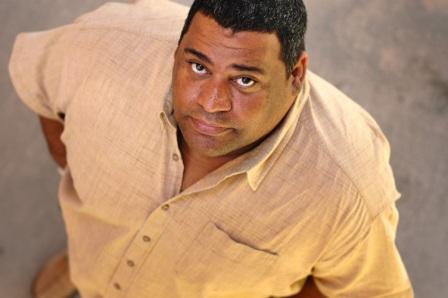 Men do communicate, often very directly, but women sometimes cannot accept how simple what we have to say is. We seldom play games—we aren't that sophisticated. If we don't call you for a couple of days after a date, it is because either we are afraid you will think we are stalkers (and we will call on day three) or we aren't into you. That's all there is.
Men do communicate, often very directly, but women sometimes cannot accept how simple what we have to say is. We seldom play games—we aren't that sophisticated. If we don't call you for a couple of days after a date, it is because either we are afraid you will think we are stalkers (and we will call on day three) or we aren't into you. That's all there is.
We are as nervous as you are about sex; I don't care what you've heard. Your anatomy is a mystery that nobody bothers explaining to us. Even when we think we have mastered one woman's body, every body is different. We feel inadequate if we can't satisfy you in bed, and since no one has told us what to do with feelings of inadequacy, we project them onto you. Sad but true.
We are very insecure about how we look and what you really think about us, and we are excited when you do small, nice things for us like make coffee or come with us to the barber or just buy us a good book. We've been trained never to show this side to you, but it is there.
We are not subtle creatures. You might think that when you play with your hair in our presence, we know that means you like us. We don't know for sure. Men who do are bad men (sorry, guys!). And anything you've been told about playing hard to get is wrong.
We crave cuddling and hand-holding, maybe even more than you do.
We are desperate to please you because we know you are far sexier and more beautiful than you will ever admit to yourself, and we're confused (but extremely happy) as to why you like us.
Here's the thing: You rescue us every day in small, quiet ways, so why not in this way? Let us into your mystery, tell us how you would like to be loved, show us how to see you, really see you.
cheers,
k
i'm not a racist, i just play one on tv
i been too nice, too long. yep, it's definitely time i get nasty....
Earlier this week, I listened to a spot on NPR about the tensions between Latinos and blacks in post-Katrina New Orleans. During the piece, the correspondent spoke with a Colombian entrepreneur living in New Orleans who shared some of her concerns about what might happen if Barack Obama was elected president. Apparently, she was convinced that if that occurred, black people would basically declare open season on Latinos, robbing them in the streets. She made sure to note, however, that she wasn’t racist.
Uh-huh. Ever since it started to look like Obama actually had a chance of cinching the Democratic nomination, it seems like there’s been a new race-based controversy to pop up every week. Each mini-debacle sets off a heated flurry of opinionated responses from everyone that can form a loosely coherent sentence: from political pundits to the guy standing next to me at the coffee maker in the morning.
Instead of engaging in and being distracted by the fray, I’ve been trying to hold my tongue as much as possible, offering a few terse replies only if I’m directly asked what I think about the latest issue. But hearing this NPR piece sort of pushed me over the edge. There are some very disturbing trends that I just can’t keep from commenting on any longer. Namely,
"I’m not racist" The ‘I’m not racist’ disclaimer has become the modern-day equivalent of a cootie shot. All you have to do is say those 3 words and…voila! An instant invisible force field goes up around you, giving you carte blanche to say all manner of racist / prejudiced things without anyone being able to call you on it.
A long-held belief of mine that always raises eyebrows when I share it with others is that, ‘Racism should be kept in the home’. Could you pull your eyebrow down please? Let me explain. The reality is that, as tribal-minded people, we are always going to have some disparaging – and often humorous – generalizations about people from another (or even our own) tribe. Someone’s driving spastically in a Corolla? Gotta be an Indian (red dot, not feather). Someone dancing spastically on the dance floor? Probably a white dude. Guy overcharging you for parking downtown? Say it with me…Ethiopian. Woman screaming, ‘PICK COLOR!’ when you walk into the nail shop? Yeah…Chinese. Actually, she’s more likely to be Vietnamese, but they all look alike, right?**
Point is, we’ve all made or laughed at a joke that pokes fun at someone of a particular race, ethnicity, geographical origin, etc. And please don’t front and say you haven’t. You know you love Dave Chappelle as much as I do.
But I believe that if you’re going to say / do something racist, say / do it in the privacy of your own home (or car, ‘cause those bloody Indians are always on the move). I don’t doubt for a minute that some of my ruddy-necked co-workers probably eat their meals on confederate flag placemats and ask Jesus to, “Please bless David Duke, John Rocker, and Bill O’Reilly” every night in their bedtime prayers. Honestly, I really don’t give a hot one. Just as long as they put their ‘plays well with others’ face on as they close the front door behind them each morning and head to work with moi, we’re cool. A certain amount of tribalism is understandable. But when it crosses over to prejudice - meaning when an individual makes illogical and irrational judgments against whole groups of people based on these tribal stereotypes – that’s a huge issue. Which brings me back to the chica on the radio. To think that this seemingly educated woman believes that if a black man is elected President, it will automatically usher in the day where black people begin attacking latinos on the street, is not only racist and prejudiced, but also mildly retarded. To think that she can tack the words, ‘I’m not racist’ on the end of her statements and thereby excuse herself from admitting the fact that she really is, is a pathetic ruse that I, for one, ain’t buying. Sorry hon, your racism is showing.
“What you say ‘bout my mama Obama?”
Is it just me or has every black person you know all of a sudden become black pride enthusiasts or black nationalist watchdogs, ever vigilant and on the lookout for someone who might be saying something wrong about Obama in particular or black folk in general? Don’t get me wrong, I absolutely believe that we should call people on the carpet who are supporters and enforcers of institutionalized racial prejudice or those that are given a platform to spout hate-based propaganda with impunity. But a lot of people (especially my people) aren’t even taking the time to really evaluate what they’re seeing and hearing before they launch some passionate, uninformed attack against it.
Here it is 2008, and African-Americans are still sooooo worried about how other people see us, that we can’t even be honest and real about some of the f*cked up issues plaguing our community. We spend so much time listening out for the N-word, and chasing crackpot comments around from place to place, that we often fail to focus on creating fundamental change in our families and homes, and completely abandon the notion that it’s how we view ourselves that matters more than how others view us.
And now we’ve got the right Reverend Jesse Jackson giving Obama flack about calling for greater responsibility from black fathers!? Now if Jesse had a penny’s worth of sense, he would sit his philandering, irresponsible ass down and STFU, instead of jumping on the bandwagon of folks whose ears prick up every time they hear the phrase, “Black people need to…” coming out of somebody’s mouth other than their own.
Monkeys. The lot of them.
The politics of fear Which brings me to the latest brouhaha re: the cover pic of Barack and Michele Obama on this month’s New Yorker.
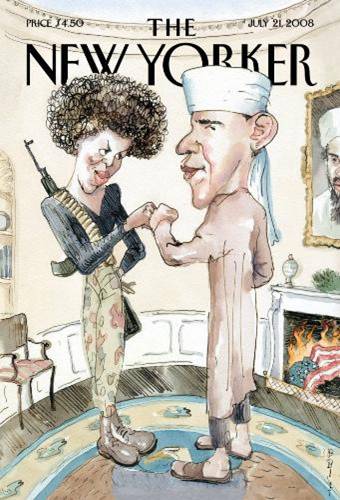 First off, I have to say, the sh*t is funny, in the same way that Dave Chappelle is funny. Even though the topics he makes fun of are ‘sensitive’, what he speaks is TRUE. Sad as it may be, there are people who REALLY do believe that Obama is a terrorist agent trying to infiltrate the White House, and the cartoon is a satirical, intentionally provocative slap in the face to those who hold that idea. Is the cartoon 100% appropriate? Ehhh, ok. It’s probably straddling the fence a bit, especially since there’s no corresponding article that could further explain the intent of the image. But the title of the pic is ‘The Politics of Fear’, which is the primary tool that hysterical anti-Obamaites are using to win devotees to their cause. As in:
- Be afraid of the big black man and his big black wife.
- Be afraid because he has a Muslim name and yet, your women secretly find him attractive.
- Be afraid of what the blacks might do if one of their own was the leader of the nation that has systematically denigrated them and other people of color for hundreds of years.
- Be afraid of seeing a picture of a President and a First Lady that look different than every other one you’ve seen in the HISstory books since your youth.
- Be afraid of a time when fear and hatred might actually motivate people less than hope and change.
- Be afraid of a time when the words ‘I’m not racist’ will have lost all their magical powers.
- Be afraid of having your real self exposed for all the world to see.
First off, I have to say, the sh*t is funny, in the same way that Dave Chappelle is funny. Even though the topics he makes fun of are ‘sensitive’, what he speaks is TRUE. Sad as it may be, there are people who REALLY do believe that Obama is a terrorist agent trying to infiltrate the White House, and the cartoon is a satirical, intentionally provocative slap in the face to those who hold that idea. Is the cartoon 100% appropriate? Ehhh, ok. It’s probably straddling the fence a bit, especially since there’s no corresponding article that could further explain the intent of the image. But the title of the pic is ‘The Politics of Fear’, which is the primary tool that hysterical anti-Obamaites are using to win devotees to their cause. As in:
- Be afraid of the big black man and his big black wife.
- Be afraid because he has a Muslim name and yet, your women secretly find him attractive.
- Be afraid of what the blacks might do if one of their own was the leader of the nation that has systematically denigrated them and other people of color for hundreds of years.
- Be afraid of seeing a picture of a President and a First Lady that look different than every other one you’ve seen in the HISstory books since your youth.
- Be afraid of a time when fear and hatred might actually motivate people less than hope and change.
- Be afraid of a time when the words ‘I’m not racist’ will have lost all their magical powers.
- Be afraid of having your real self exposed for all the world to see.
Yes. Be very afraid.
** Please note: these statements were made for illustrative purposes only. I’m not racist. :-D
P.S. – I plan to do my part to end racial divisions by marrying Jon Stewart. Swoon.
cheers, k
second-hand (gun)smoke?
how do you feel about georgia's new gun law?
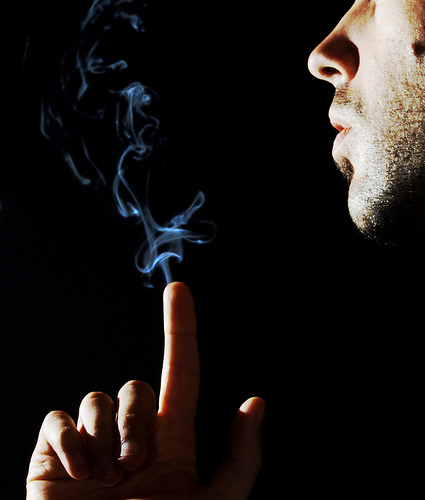
cheers, buyaka!
k
"There are some circles in America where it seems to be more socially acceptable to carry a hand-gun than a packet of cigarettes.” ~ Katharine Whitehorn
modern day miracle or ‘tranny mess’?

I’m trying to reserve judgement on this, but I can’t help but be profoundly disturbed by the story of Thomas Beatie.
Beatie, a 34-year old husband and soon-to-be parent, wasn’t always the man he is today. He was born a woman. After spending most of his life as Tracy, Beatie decided to begin testosterone therapy and to undergo surgical breast removal so that s/he could assume the role of a man.
You’d think that’d be shocking enough. But wait, there’s more.
Soon after legally becoming a man, Beatie married his current wife, Nancy. Due to a previous hysterectomy, Nancy is unable to have children. But the couple wanted to fulfill their dream of having a family together. So together, they decided that Thomas would discontinue his testosterone treatments and conceive a child via artificial insemination.
Uh-huh. You read it right. Beatie, who is legally a man, but still possesses the physical equipment of a woman, will soon become the mother of his own child!
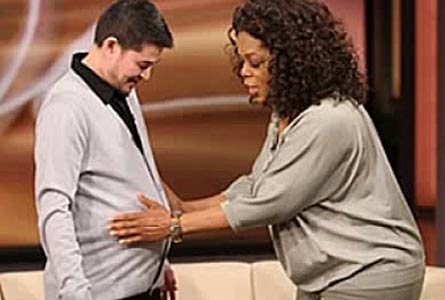 Beatie is scheduled to appear on today’s Oprah Show, where he and his wife will share the details of their story, including the doctors who refused to treat Thomas during the pregnancy and their first failed attempt at having Thomas bear the couple’s child.
Beatie is scheduled to appear on today’s Oprah Show, where he and his wife will share the details of their story, including the doctors who refused to treat Thomas during the pregnancy and their first failed attempt at having Thomas bear the couple’s child.
What disturbs me about the whole thing is…well, there are several things that disturb me:
1. Not that I’m an Oprah Show watcher, but since when did Oprah start covering stories that would be much more appropriate for Jerry Springer?
2. I’m all for medical and scientific advancements, but this story is just another one of many that makes me question: just because we are technically capable of doing something, does that mean we should?
Here you have a gal who decides that she no longer wants to be a gal. So, gal says to herself, “I’ll just go down to the local doctor’s office and sign up for lifelong injections of male hormones. And while you’re at it doc, go ahead and slice off those 'mams' – they’re kinda gettin’ in the way, and they don’t really fit with my new image.” Some time later gal/guy thinks to her/himself: “Oh, wait! I knew there was something I forgot to do before shedding my female self. Lemme put this man thing on pause for a bit and return to my regularly scheduled gender. I’ll just order me up some of that anonymous donor sperm, and during the commercial break for Star Trek, I’ll impregnate myself with it and set the timer for, oh…9 months or so. After that, it’s back to the boys club for me!” Yeah, that’s just a little too ‘Island of Dr. Moreau’ for me.
3. What is this child going to grow up like? I mean, we all have our issues with Mom and Dad, but can you imagine being this kid and having to process the concept that daddy is really mommy and mommy technically isn’t related to me at all?
 4. And the most important question of all: Exactly what bathroom is Mr. Mom using these days?
4. And the most important question of all: Exactly what bathroom is Mr. Mom using these days?
What a world.
Read Thomas Beatie’s first-person interview in the Advocate (a LGBT webzine)
See the Oprah Show trailer
cheers,
money's growing like grass(ley) - prosperity pastors still under scrutiny
Today marks another milestone in the continuing investigation of 'The Grassley Six'
"...maybe your soul you'd sell to have mass appeal"~ Guru
Today is the deadline for six well-known ministers to hand over records of their spending to Senator Chuck Grassley, ranking member of the Senate Finance Committee. Two of the so-called ‘Grassley Six’ are Atlanta-area preachers: Bishop Eddie Long of Lithonia, and Rev. Creflo Dollar of World Changers Church International in College Park. Of those two, only Dollar has agreed to participate with the Committee’s investigation.
So just who is this Senator Grassley and why is he after these ministers specifically? Good question.
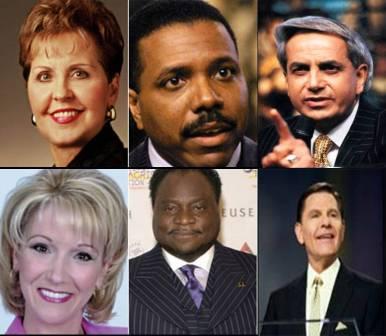
A Republican from Iowa, one of Grassley’s self-professed missions as a Finance Committee member is a “crusade to ferret out tax avoidance schemes and shelters”. According to the press release on his website, Grassley had received “complaints from the public” that prompted him to launch a more detailed investigation into six media-based ministries to ensure that money given to them has been “spent as intended and in adherence with the tax code". The other ministers being scrutinized are: Benny Hinn, Kenneth and Gloria Copeland, David and Joyce Meyer, and Randy and Paula White.
When this story first broke in November of last year, ‘god-children’ and ‘dirt-worshippers’ alike were all riled up about it. Those who supported the ministers called Grassley’s probe a modern-day witch hunt, just another way that the devil was trying to silence the Word from spreading among the people. Those who supported the investigation thought it was high time that these flashy ministers were taken down a peg or two and lambasted anyone who would ever follow their teachings as blindly faithful sheep.
What’s my opinion? Gee, thanks for asking.
I have to admit that I’m a bit biased. For a large part of my life I was Catholic. The priest of our parish always had a decent car and a decent place to live – all of which was paid for by the diocese. It just instilled in me the notion that the members of the church should provide the man of god with the basic essentials so that he can focus on his duties of religious study and service to the church. And why would a truly focused spiritual leader require anything other than the basics?
If you take a peek at the Bible, you’ll notice that the prophets of old weren’t big ballin’…they lived austere lives with the most meager surroundings. Many times, they didn’t even know where their next meal would come from, but they were always provided for (1 Kings 17:1-16). The kings (a.k.a. politicians) of the Old Testament were the ones living in luxury, and quite often fell victim to the trappings of excess. At which point, the wild-eyed, threadbare prophet would come in and admonish them from straying from their faith (2 Samuel 12:1-7). You see the same dynamic play out in the New Testament, where the Sadducees and Pharisess have taken on the role of the opulent leaders of the community, and Jesus and John the Baptist are the revolution-minded ascetics who dare to wake them from their spiritual sleep.
"It is easier for a camel to pass through the eye of a needle than for a rich man to enter the kingdom of God” (Matthew 19:24)
Spiritual parallels aside, what’s really the crux of the matter is this: these ministers are the heads of very large, very visible non-profit corporations, and just like the executives of for-profits, they are bound by certain regulations that have nothing to do with Biblical principle per se, but have everything to do with ‘giving unto Caesar’. So when good ol’ Caesar (a.k.a. Grassley and his friends at the IRS) comes a-knocking and says they got some ‘splaining to do…well, what’s the problem with that? It’s no different than the SEC investigating the side dealings and intermingling of personal and corporate finances by the heads of companies like Enron, Tyco, and Worldcom. The heads of those companies bilked thousands of people out of their retirement funds and 401k monies, all because they wanted to keep getting richer on the backs of the people supporting them.
At least they weren’t doing it in the name of the Lord.
What’s your opinion?
cheers,
k
stuff black people like...i think
Since I don't have the heart to tell my mama about my most recent self-discovery, I decided I'd better redeem myself...quick.
Ok. Once I got over the initial shock of discovering that I might actually be white, I realized that there was no way in hell I could let my mother know... I mean, it'd break her heart! So I figured I'd better try and redeem myself and set the record straight by giving you the skinny on what black people like, as only a black person could tell ya!
- 1. Keepin’ it real – Coincidentally, this is the primary reason I’m writing this post. Of course – as Dave Chappelle enlightened us – some fools take that sh*t waaaay too far.
- 2. Conspiracy theories – Every black person knows that AIDS was ‘invented’ (and why), and suspects that Biggie’s and Tupac’s deaths were probably orchestrated by the government. But really, can you blame us? With agencies like COINTELPRO and incidents like the Tuskegee Experiment as part of our storied American past, it’s better to be suspicious than syphilitic.
- 3. The O.J. Simpson verdict – Ask any Black person where they were when the verdict was delivered, and they’ll tell the story with more breathy excitement than they recount the time their team made it to the Superbowl.
- 4. Hookups – Paying full price is for lames. Whether it’s free music downloads, discounted rims, or easy access to the VIP lounge, we love being able to proudly announce, “Don’t sweat it. I got a hookup.”
- 5. Reality TV – If this were the 80s, this entry might have been reserved for soap operas (or ‘the stories’ as my aunty calls them). But the 21st century replacement is reality TV shows. At first we used to watch them to see how long the token black person would last before being dramatically voted off by the other cast members. Now we watch to see how many steps they’re gonna set us back on the black progress scale.
- 6. Hair salons / barber shops – Having been natural for the last 11 years, I don’t get to visit often, but when I do, I know I’m gonna get caught up on everything that’s ‘hot in the streets’. Sure you can get your wig shook there, but more importantly, you can get word-of-mouth news of the Diaspora. Plus, black barber shops and hair salons are single-handedly keeping Jet magazine (if not the entire Johnson publishing empire) in business.
- 7. Gossip – Start any sentence with ‘Gurrrrrrrrl, did you hear about…’ Or ‘you didn’t hear this from me, but…’ and you will have the attention of every black person in a 10-mile radius. The best gossip is usually found while visiting #6
- 8. Marijuana – bringing blacks and liberal whites together in peaceful harmony since 1964.
- 9. Remixes – Many black artists have damned near made a career out of making one hot track and then flipping it 1,714 times (case in point: R. Kelly).
- 10. Good hair – I’ll probably piss some people off with this one. But that doesn’t make it not true. A term that’s used to define black hair that has a naturally relaxed curl pattern, many black people’s desire to acheive the look of it has driven them to such desperate measures as: the texturizer, the wave nouveau and the jheri curl.
- 11. Set claiming – If you’ve ever been in the club and heard shouts of: Guyana massive!, Zone 3! or WEST SIDE!! You’ve experienced the phenomenon known as ‘set claiming’. No matter how small the country, state, city, or neighborhood black people LOVE to represent their turf. MAC-TOWN fo’ LIFE!!!
- 12. Tyler Perry – Honestly, I feel like if you’ve seen one Tyler Perry movie, you’ve seen ‘em all. But he gets much respect for: 1. keeping most of black Hollywood employed, 2. consistently churning out movies that (though they may be formulaic) present positive images of black people that make us laugh, cry, and yell at the screen, and 3. being the best modern-day rags to riches story we can point to.
- 13. Gospel plays – Somebody’s got to be going to these damned things, and I know it ain’t white people. Besides, it’s where #12 got his start.
- 14. Spades / bid whist / dominoes – Which one we love most is usually a pretty good indicator of what region of the country we’re from. In the South, it’s spades. Midwest: bid whist. West Coast: break out the bones.
- 15. Sh*t Talking – May also take the form of ‘joneing’, ‘cracking’, ‘the dozens’ or ya mama jokes. You are guaranteed to witness the finest quality and most intense variety during #14
- 16. The Bus Stop (a.k.a. the Electric Slide) – My high school Spanish teacher once showed us a video of people dancing flamenco, after which he lamented the fact that black people didn’t have a sort of ‘national dance’ that could be performed by all generations. One of my fellow students quickly piped up, “What about the Bus Stop?” Spend more than 1 hour at a black family reunion and you're bound to see them... Set it off! Which brings me to...
- 17. Family reunions - I never really thought about it before, but found out this past summer that this is a uniquely African-American ritual. I was in a busy tourist locale with a couple of non-black friends, and there were lots of family reunion groups (in their matching tees) peppered about the place. My friends wondered aloud why all those people were walking around dressed alike. As I explained, they were genuinely shocked at the concept, and the fact that we even have t-shirts made to commemorate the events. Go figure.
- 18. Claiming to have Indian (feather, not red dot) heritage – C’mon, you know that’s how you explain away the fact that your great-grandmother or great-great grandfather was so light-skinned and had 'good hair'.
- 19. Barack Obama – has the same unifying effect as #8, without the smell or the potential legal entanglements
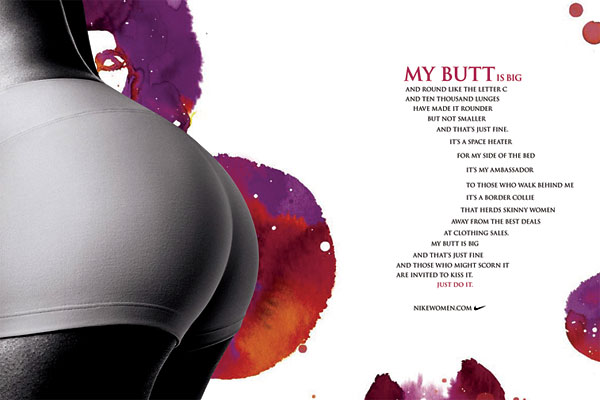
- 20. Big booties – Every black man wants one, and (most) every black woman has one. Sadly, I’m still waiting for mine to show up.
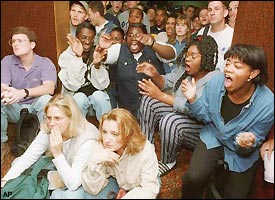
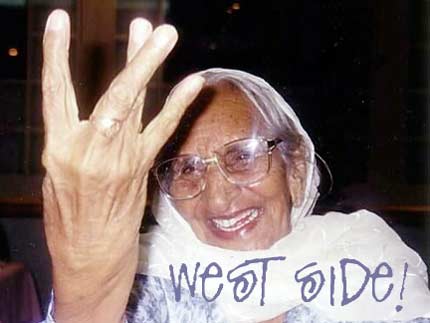
So there! You see, I AM black. Well, mostly. Now would somebody give me back my afro pick, please?
cheers (bee-yatches!),
k
a shocking discovery
A chance visit to a popular website reveals the shocking, long-suspected truth about my heritage.
I was trolling through a fellow Atlantan's blog last week and happened upon a post she’d written about a site called, ‘Stuff White People Like’. “Oh this oughta be interesting,” I thought and clicked on over to check the site out. After about 5 minutes perusing the list, I made a shocking discovery.
I’m white.
This isn’t the first time I’ve had my racial identity called into question. More than one friend has suggested on more than one occasion that I may indeed not be as black as I think I am. My former roommate (a gay white Republican from east Tennessee) even dubbed me, ‘the whitest black girl I know’. I’ve always defended myself against these unfounded accusations by pointing out that I have nappy hair, graduated from an HBCU, and have actually seen and like all of Spike Lee’s movies (well except for Summer of Sam. That sh*t was just crazy). The most I’ve ever conceded to being is Filipino. But after visiting this site, which is clearly the foremost – if not the singular – authority on the subject of what white folks like, maybe it’s time I face the facts. See the list below for why I’m convinced. Oh, and don’t get too cocky…you might just find out that you’re white too (well, I mean for those of you who aren’t already sure that you are).
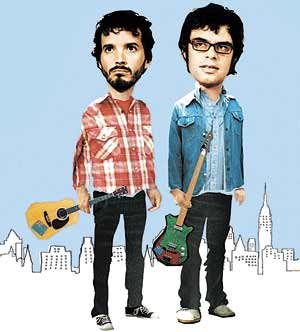 #77 Musical Comedy - Flight of the Conchords, anyone?
#76 Bottles of Water – though I’m usually cool with ‘Chattahoochee’s finest’, I recently became addicted to mineral water…from Poland
#70 Difficult Breakups - no comment
#73 Gentrification – not a fan of the trend itself, but I keep finding myself in these ‘transitional’ neighborhoods
#69 Mos Def – I’ve been loving Dante since Black Star
#77 Musical Comedy - Flight of the Conchords, anyone?
#76 Bottles of Water – though I’m usually cool with ‘Chattahoochee’s finest’, I recently became addicted to mineral water…from Poland
#70 Difficult Breakups - no comment
#73 Gentrification – not a fan of the trend itself, but I keep finding myself in these ‘transitional’ neighborhoods
#69 Mos Def – I’ve been loving Dante since Black Star
 #59 Natural Medicine – is that a tumor? Put some tea tree oil on it!
#58 Japan – I just love the way the words manga, sakura, and Hayao Miyazaki roll off my tongue; I even refer to my new gig as the okiya
#50 Irony
#49 Vintage
#48 Whole Foods and Grocery Co-ops – droooool….
#44 Public Radio – NPR has been my wake-up routine since 8th grade
#43 Plays
#42 Sushi
#41 Indie Music – I can’t remember the last time I listened to music on the radio
#36 Breakfast Places
#35 The Daily Show/Colbert Report – John Stewart is my Hebrew boycrush
#33 Marijuana – how’d that get in here?
#28 Not having a TV – last year marked the 1st time in my adult life that I’ve ever even had cable
#22 Having Two Last Names – I am the artist formerly known as Demps
#59 Natural Medicine – is that a tumor? Put some tea tree oil on it!
#58 Japan – I just love the way the words manga, sakura, and Hayao Miyazaki roll off my tongue; I even refer to my new gig as the okiya
#50 Irony
#49 Vintage
#48 Whole Foods and Grocery Co-ops – droooool….
#44 Public Radio – NPR has been my wake-up routine since 8th grade
#43 Plays
#42 Sushi
#41 Indie Music – I can’t remember the last time I listened to music on the radio
#36 Breakfast Places
#35 The Daily Show/Colbert Report – John Stewart is my Hebrew boycrush
#33 Marijuana – how’d that get in here?
#28 Not having a TV – last year marked the 1st time in my adult life that I’ve ever even had cable
#22 Having Two Last Names – I am the artist formerly known as Demps
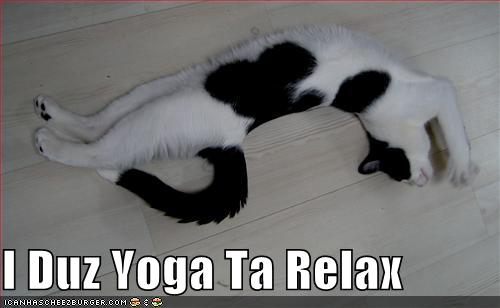 #19 Traveling
#15 Yoga – I brake for child’s pose
#14 Having Black Friends – some of my best friends are black
#9 Making you feel bad about not going outside – yep, even in the rain!
#8 Barack Obama
#7 Diversity
#5 Farmer’s Markets
#1 Coffee – only 100% arabica, delivered through an IV drip (or a french press if I’m slumming it)cheers,k
#19 Traveling
#15 Yoga – I brake for child’s pose
#14 Having Black Friends – some of my best friends are black
#9 Making you feel bad about not going outside – yep, even in the rain!
#8 Barack Obama
#7 Diversity
#5 Farmer’s Markets
#1 Coffee – only 100% arabica, delivered through an IV drip (or a french press if I’m slumming it)cheers,k
a 21st century problem
As African-Americans continue to increase their socio-economic standing in this country, will class become the 'color line' of the 21st century?
“Herein lie buried many things which if read with patience may show the strange meaning of being black here in the dawning of the Twentieth Century. This meaning is not without interest to you, Gentle Reader; for the problem of the Twentieth Century is the problem of the color-line. “~W.E.B. Du Bois
I was browsing the discount stacks at a local Barnes and Noble a couple of days ago and scored a low-priced hardback version of W.E.B Dubois’ 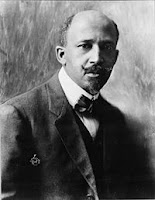 The Souls of Black Folk”. Being a grad of CAU, this was a book I had often heard about from many of my professors and fellow students, but never took or found the time to actually read. One of the best known quotes from the book is Dubois’ rather accurate assertion that: "The problem of the 20th century is the problem of the color line". Indeed a major theme of American culture from the Reconstruction era through the ‘80s and ‘90s was that of black people fighting to establish their identity as a race and to achieve equality in the political, educational, and economic arenas of this country. But now we’re well into the first decade of the 21st century, and while Don Imus and Jena are the most recent reminders that the American system is still far from perfect when it comes to treating its darker citizens as equal, it can no longer be argued that blacks don’t have access to almost all of the same opportunities as whites and other racial and ethnic groups.
The Souls of Black Folk”. Being a grad of CAU, this was a book I had often heard about from many of my professors and fellow students, but never took or found the time to actually read. One of the best known quotes from the book is Dubois’ rather accurate assertion that: "The problem of the 20th century is the problem of the color line". Indeed a major theme of American culture from the Reconstruction era through the ‘80s and ‘90s was that of black people fighting to establish their identity as a race and to achieve equality in the political, educational, and economic arenas of this country. But now we’re well into the first decade of the 21st century, and while Don Imus and Jena are the most recent reminders that the American system is still far from perfect when it comes to treating its darker citizens as equal, it can no longer be argued that blacks don’t have access to almost all of the same opportunities as whites and other racial and ethnic groups.
Yet – and maybe I’m just speaking for myself here – there is still this nagging feeling that with each of the individual gains reaped from integration, affirmative action and diversity initiatives, there has been a steep price paid by the black community as a whole. This morning as I listened to NPR during my get-ready-for-work routine, they aired a segment on what was termed a new kind of racial segregation – that being a division within the black community based on class. During the piece, Juan Williams relayed the results of a poll which highlighted that the values of middle / upper class blacks are more in line with those of whites in the same economic  stratum than they are with those of low-income blacks.
stratum than they are with those of low-income blacks.
As I listened, I immediately recalled a discussion I had during lunch with one of my mentors this past weekend. She and her family recently left Atlanta and took up residence on St. Simon’s Island, a rather exclusive community that’s almost completely white. As we talked, she shared her concerns that – though she loved her community – she was dismayed at the fact that her son had very little chance to interact with other black boys on a regular basis. He is the only black male in his elementary school and only one of three black children in the school overall. The closest mainland town that lies just on the other side of the bridge to St. Simon’s is Brunswick, where over half of the population is Black. However that same population is characterized by a 70% high school dropout rate, single-mother households, higher-than-average rates of disease, etc. Not surprisingly, she’s not enthralled that this is the only real-life image of other Black people her son has the opportunity to be readily exposed to.
Another oft-quoted term from Dubois is, "the talented tenth". Dubois strongly advocated the idea that a small group of college-educated blacks would be responsible for, “developing the best of this race that they may guide the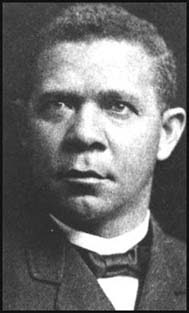 Mass away from the contamination and death of the worst, in their own and other races". Dubois’ contemporary and ideological opponent, Booker T. Washington, asserted that blacks should first concern themselves with establishing financial strength and independence within their own community by developing practical skills and trades.
Mass away from the contamination and death of the worst, in their own and other races". Dubois’ contemporary and ideological opponent, Booker T. Washington, asserted that blacks should first concern themselves with establishing financial strength and independence within their own community by developing practical skills and trades.
It became clear to me as I continued listening to the NPR segment, that this nouveau segregation may very well be the natural (though unexpected?) side-effect of Dubois’ talented tenth paradigm. The sad irony, it seems, is that after decades of seeking the elusive American ‘promised land’, we may have arrived, but we’ve left so many of our kin behind that it looks almost exactly like the Egypt we fled. As I drove to work (where I’m usually the only black face I see in my many meetings), I was still pondering many of the questions sparked by the NPR piece:
Is the problem of the 21st century the problem of intra-racial segregation?
Is it really accurate to say that middle and upper class blacks don’t do enough to help black people on the lower end of the socioeconomic spectrum? And if it is, how can we do it in a way that amounts to more than just one-hit charity binges but affects long-lasting mindset changes?
Is it time for us to abandon Dubois’ talented tenth mentality and adopt a new approach?
(sigh) Where’s Booker T. when you need him?
cheers,
k






